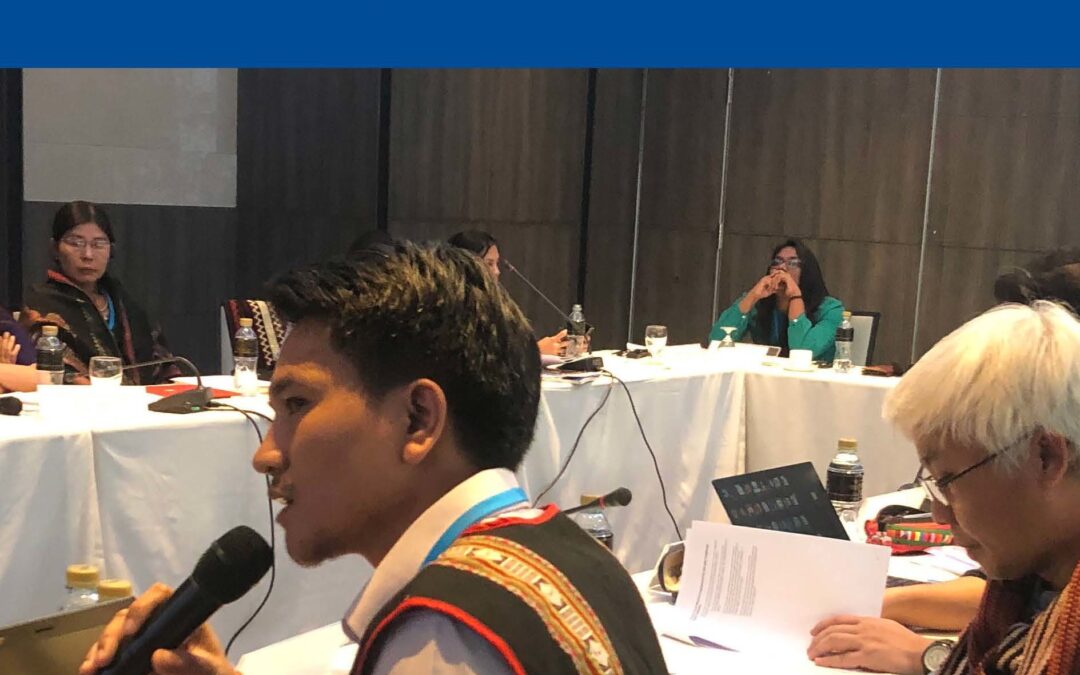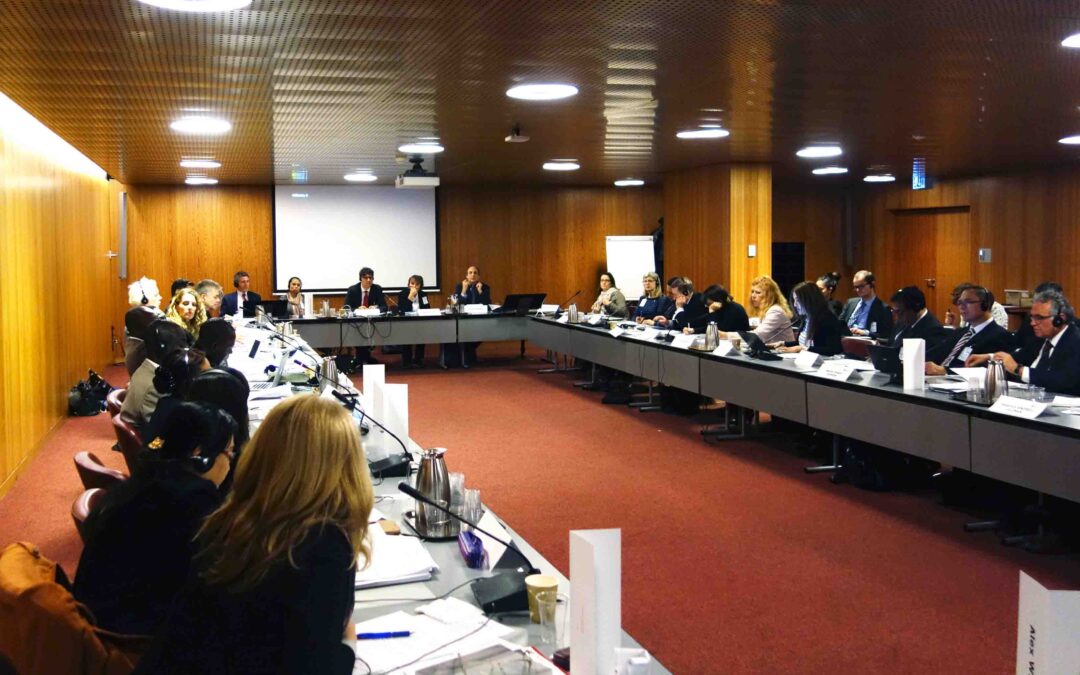
Jun 21, 2019 | News, Publications, Reports, Workshop reports
The ICJ has today published a report on indigenous and other traditional or customary justice systems in Asia.
The report is based on discussions at the 2018 Geneva Forum of Judges & Lawyers which was convened in Bangkok, Thailand, in December.
The Bangkok meeting brought together judges, lawyers, and other legal experts from around the Asia-Pacific region, from both formal State justice systems and indigenous and other traditional or customary systems.
Participants reaffirmed the potential for indigenous and other traditional or customary justice mechanisms to contribute to the realization of equal and effective access to justice, particularly for indigenous, rural, poor and other marginalised populations.
Participants stressed the importance of sustained consultations and engagement directly with indigenous justice systems, to encourage their development in harmony with international human rights standards and in coordination with more official or formal national legal institutions.
Participants also highlighted the opportunities and risks associated with similar forms of constructive engagement with other, non-indigenous, traditional or customary justice systems. The relevance of UN Sustainable Development Goal 16 was also highlighted.
Participants further agreed that States must at the same time ensure that formal systems are also made more accessible, both in practical and in cultural terms, to relevant communities.
The report urges that, in line with the UN Declaration on the Rights of Indigenous Peoples, constitutional or other legal provisions should recognize the role of indigenous justice systems, within an overall framework for protection and promotion of international human rights standards.
Indigenous peoples and States should jointly consider means for improved coordination and collaboration between indigenous and non-indigenous justice systems, with a view to seeing the different systems work in harmony to provide effective access to justice and protection of human rights for all people.
The report cautions however, that a similar approach may or may not be appropriate in relation to certain other traditional and customary justice systems not covered by the UN Declaration on Rights of Indigenous Peoples.
The report also outlines experiences from a number of countries around the region, both in terms of existing obstacles to equal access to justice, and the possibilities for constructive engagement.
It also identifies a number of legal and policy questions of continuing controversy, including on the relationship between indigenous and other traditional or customary justice systems, and the official State justice system, and how international human rights and rule of law standards should be applied.
The UN Special Rapporteur on the Rights of Indigenous Peoples, a key participant in the Bangkok meeting, has announced that her report to the Human Rights Council in September 2019 will focus on indigenous justice systems.
The interactive dialogue on her report will be an important opportunity for States and civil society to further exchange views on the best means of implementing the relevant provisions of the UN Declaration on the Rights of Indigenous Peoples in the diversity of contexts around the world.
The Geneva Forum global and regional consultations, the Special Rapporteur’s report and associated dialogue, and the ICJ’s own research, global experience and expertise, will provide a foundation for the development by the ICJ of further legal, policy and practical guidance to be published in 2020.
The report summarizing discussions at the 2018 Forum should be read in conjunction with the separately published and periodically updated Traditional and Customary Justice Systems: Selected International Sources, which compiles relevant treaty provisions, standards, conclusions and recommendations of UN and other expert bodies, as well as the Report of the 2017 Forum.
The Geneva Forum is an annual global meeting of senior judges, lawyers, prosecutors and other legal and United Nations experts, convened by the ICJ through its Geneva-based Centre for the Independence of Judges and Lawyers, with the support of the Canton and Republic of Geneva (Switzerland) and other partners.
Each year, participants and the ICJ discuss an issue relevant to the independence and role of judges, lawyers and prosecutors, with a view to developing and disseminating practical guidance for practitioners.
Contact
matt.pollard(a)icj.org
Universal-Trad Custom Justice GF 2018-Publications-Thematic reports-2019-ENG (full report in PDF)

Dec 16, 2015 | Events, News, Video clips
More than 40 senior judges and lawyers from all parts of the world have made an important contribution to efforts to hold judges accountable for involvement in human rights violations and judicial corruption, by participating in the sixth annual ICJ Geneva Forum of Judges & Lawyers.
The Geneva Forum is organized annually by the ICJ’s Centre for Independence of Judges & Lawyers (CIJL) and brings together judges, lawyers and prosecutors from around the world, together with UN officials and representatives from international professional associations of legal professionals, as well as academics and other experts.
This year’s Geneva Forum (14-15 December) formed part of a larger CIJL project to promote judicial accountability, through sharing of knowledge about relevant international standards and international and national good practices, between the judiciary, other legal actors, and governments and civil society around the world.
The focus of the project is on judicial involvement in human rights violations such as unjust executions, prolonged arbitrary detention including imprisonment after deliberately unfair trials, judges providing impunity to perpetrators or enforced disappearance and torture, as well as judicial corruption that leads to human rights violations.
Victims of such violations have the right to remedy and reparation, including in relation to the role of judges, and society as a whole should be able to be confident that those responsible for such judicial misconduct will be held to account.
The two days of intense and detailed discussion and debate, at times practical and at times passionate, identified wide areas of agreement amongst participants, as well as areas of divergence and questions requiring further study and deliberation. Topics covered included:
- the composition and character of accountability bodies (and particularly, the importance of judge-led processes that at the same time may benefit from involvement of representation of the legal profession, legal academia, and general public – while excluding undue influence from the Executive or Legislative branches of government);
- the practicalities of bringing criminal proceedings against judges;
- the role of national, regional and international professional associations;
- possible options in situations of transition to democracy where the judiciary on the whole may have been an instrument of repression of the prior regime, or situations of pervasive corruption, or conflict or post-conflict situations;
- particular considerations in relation to judicial accountability in developing countries;
- the powers and methods for gathering of evidence of judicial misconduct;
- the rights of individual judges and of alleged victims of judicial misconduct;
- the role of publicity and transparency in judicial accountability processes;
- the inclusion of safeguards against the abuse of judicial accountability mechanisms for ulterior motives, including political interference that undermines the independence of the judiciary;
- and practical means for ensuring that mechanisms and procedures, once established, operate effectively and fairly in practice.
The Forum follows a smaller expert consultation meeting convened in Tunisia in October focussing on judicial accountability in developing countries where, it is widely recognized, the negative impacts of corruption on human rights are deepest and most widespread. A report of the Tunis consultation is available here.
The Geneva Forum and Tunisia consultation are an opportunity for direct sharing of experience and expertise between practitioners, strengthening their capacity to carry out effective judicial accountability work in their own regional and national contexts, and to further disseminate this knowledge to others.
It is also an opportunity to discuss possible global strategies for promoting more effective and fair judicial accountability mechanisms and procedures.
The exchanges between leading judges and lawyers at the Geneva Forum and Tunis consultation will also directly feed into an ICJ Practitioners Guide on Judicial Accountability, with global legal, policy and practical guidance, to be published in June 2016. (Update 7 June 2016 – the Guide has now been published and is available here.)
The Practitioners Guide will be printed, published electronically, and distributed as a foundation for subsequent work by the ICJ and others at the national and regional level, from 2016 onwards, including in development-assistance recipient countries. It will join a series of Practitioners Guides published by the ICJ (nine to date, no. 10 and 11 to be published very soon), which have proved to be leading reference guides and training materials in the field of legal protection of human rights and the rule of law.
The developing countries consultation in Tunisia, and participation of practitioners from developing countries in the global Geneva Forum, will help to ensure that the Practitioners Guide is relevant to and has impact in ODA recipient countries.
The ultimate aim of the work of the CIJL, including the 2015 Geneva Forum on judicial accountability and the eventual Practitioners Guide, is to improve access to independent and impartial justice for victims of human rights violations, corruption and similar abuses, including when the judiciary itself has been involved in the wrongdoing.
The 2015 Geneva Forum, and the earlier Tunisia consultation, have been made possible with the support of the Republic and Canton of Geneva, as well as the Ministry of Foreign Affairs of Finland. The ICJ is also grateful for the assistance of the Geneva Welcome Centre (CAGI).
The list of participants to this year’s Geneva Forum is available here: Participants list (public)
The report of the Tunis consultation is available here: Universal-Tunis Consultation-Publications-Seminar and Conference Report-2016-ENG
Information about previous years’ events and publications is available here: Geneva Forum Homepage
A 2000 CIJL Yearbook focussing on Judicial Corruption is available here: 2000 CIJL Yearbook Judicial Corruption
Voices from the Geneva Forum:






